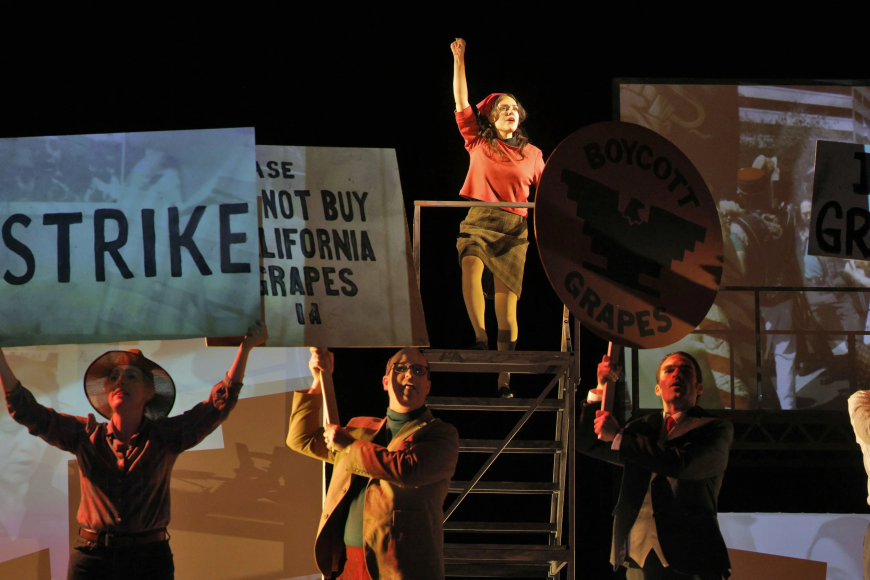
West Edge Opera unveiled another triumphant world premiere, opening its season with Nicolás Lell Benavides and Marella Martin Koch’s opera Dolores. Telling the story of a pivotal year in the life of labor activist Dolores Huerta, the show is dramatically tight and musically transporting — a work made to last, though it’s also undeniably timely.
Benavides and Koch’s take on the politics of the 1968 strike of California’s grape pickers is unabashedly progressive and they indulge in the lightest moment of agitprop when, at the end of the opera, Huerta (mezzo-soprano Kelly Guerra) chants the United Farm Workers mantra “Si, se puede” and motions for the audience to join in. On opening night, Saturday, Aug. 2, at Oakland’s Scottish Rite Center, many did. Senator Robert Kennedy (tenor Alex Boyer) is pictured as heroic, while Richard Nixon (tenor Sam Faustine) is a creep. Yet librettist Koch stays close to the historical record, even using the historical characters’ own words at times.
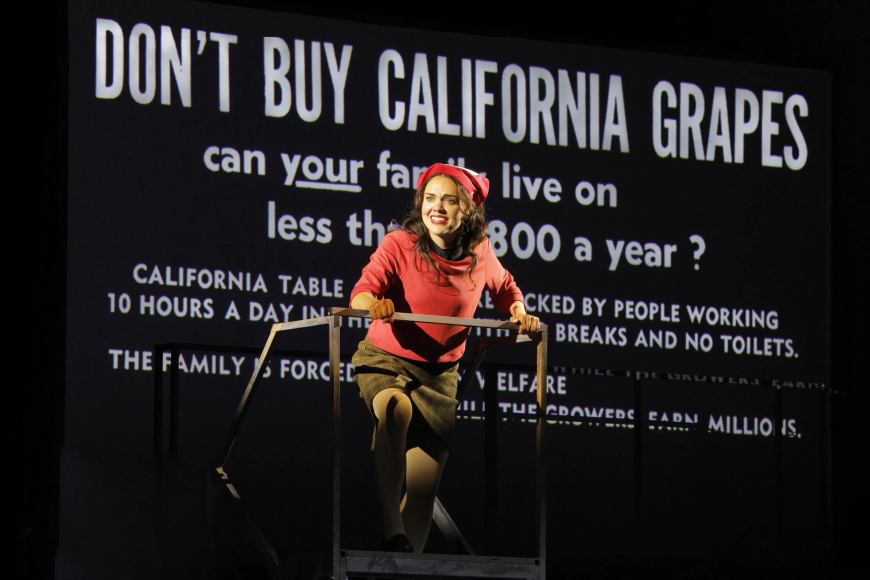
Huerta herself, 95 years old and still spry, attended the performance and joined the cast onstage at the company bows. When Benavides handed a microphone to Huerta, she said, “We know we can’t give up. Together we will get through this terrible time in our history. … And we know we will win.”
The opera explores themes that are deeply woven into the imagination of our immigrant nation. At its heart, the show is about the courage and resolve of ordinary people who are inspired to create change. Huerta’s children come up frequently in the piece — she worries that she’s not at home enough for them. As union president Cesar Chavez (baritone Phillip Lopez) prepares for a hunger strike, he keeps returning to the word “sacrificio” set to a motive that Benavides weaves through the scene and recalls briefly at the end of the opera.
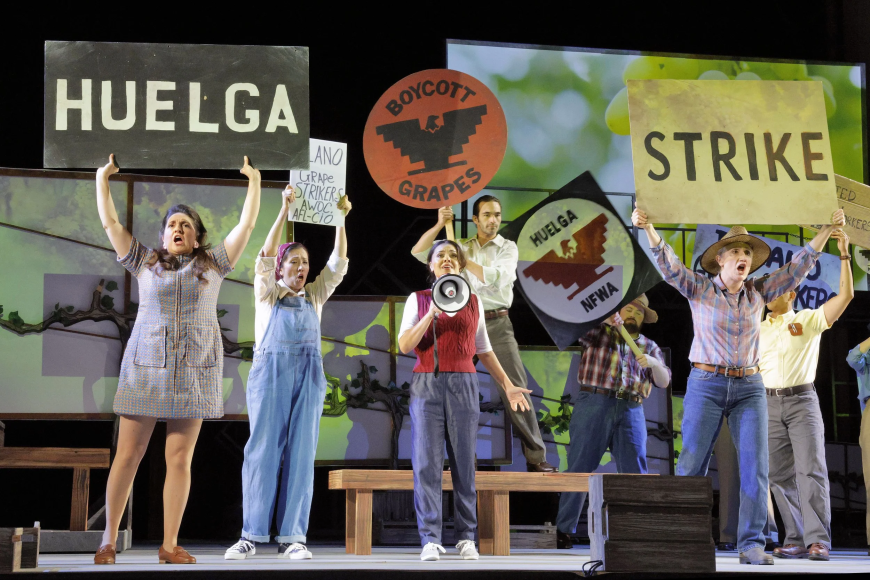
Dolores has the frisson of a masterfully paced thriller — there’s not an extra word sung. Benavides’ score keeps the story on the boil with sharp rhythms in the vocal lines, and a gamut of styles and emotions. The composer and librettist are not above adding comedy and dance into the mix. This variety is welcome in Nixon’s waltz, “I love a grape,” and then again when Huerta argues for — and gets — a mariachi band to strengthen the union’s get-out-the-vote effort. Benavides’ orchestration sounds much more opulent than its 15-player ensemble would suggest. His accompaniments are varied but also rhythmically layered, and conductor Mary Chun extracted every ounce of juice from this expansive score.
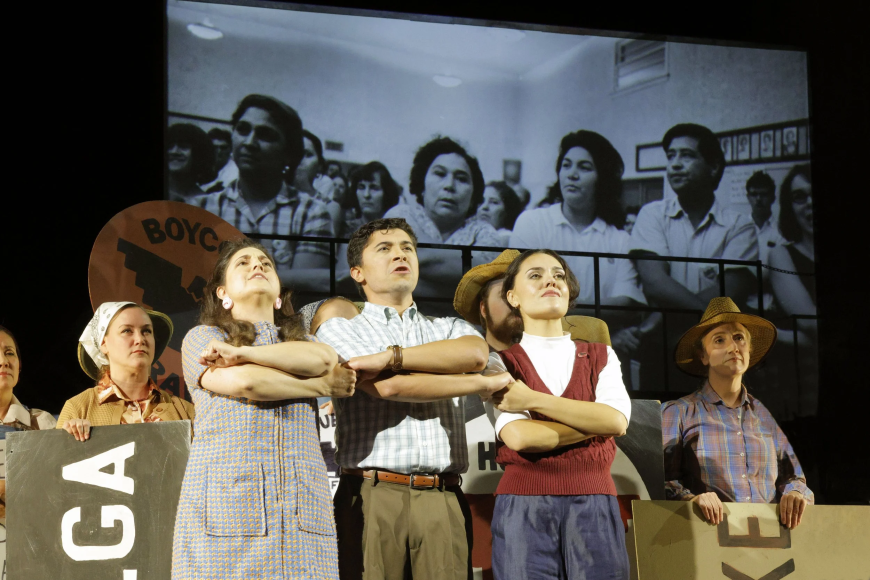
The cast and Mark Morash’s chorus were well-prepared and well-directed. Guerra’s Dolores was urgent and authoritative, with plenty of heft to her sound. Rolfe Dauz successfully portrayed labor leader Larry Itliong’s complex personality and sang powerfully. As Chavez, Lopez was focused and intense, singing gracefully in the pivotal hunger strike scene. Soprano Chelsea Hollow was rock solid as Helen Chavez and Ethel Kennedy. Boyer was commanding as Robert Kennedy and Caleb Alexander was strong as Paul Schrade. Faustine was especially chilling as Nixon, giving the role many vocal and physical nuances. As Juan Romero, the busboy who held Kennedy after he was shot, Sergio Gonzalez sang a fervent and haunted aria that was an emotional highlight.
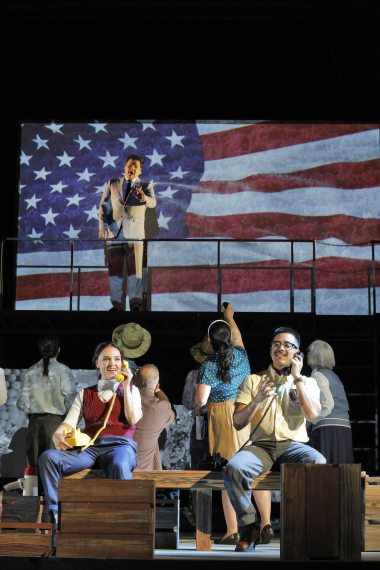
Director Octavio Cardenas did exceptional work with his singing actors. Yuki Izumihara’s projections gave the story almost a documentary feel, accentuated by Lilana Duque-Pinero’s set design which was dominated by screens and Michael Oesch’s well-conceived lighting. The costumes by Ulises Alcala, assisted by Colleen Nicole Fox, were historically spot on.
Having acquired three co-producers, Dolores is guaranteed to have further performances after this run. It deserves them.




